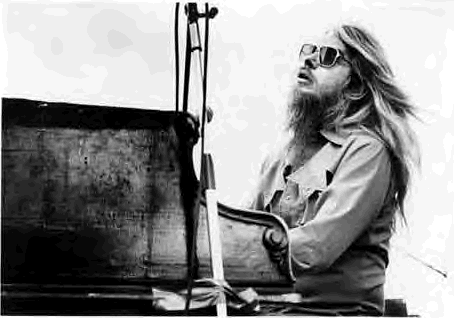
Two weeks ago I was in Nashville interviewing Leon Russell at home for today's Leisure & Arts page in The Wall Street Journal (go here or please buy the paper). I've always been a fan of Leon, who in recent years slipped from the radar a bit. That's what happens when you're independent. You have your freedom but you don't have the promotional machine behind what you're doing.
Leon's new album—Life Journey—is out today, and it's a fascinating mix of Songbook and pop standards as well as material he has always wanted to record but never could because of the expense of a big band. Fortunately, he brought producer Tommy LiPuma aboard, who was able to get the Clayton-Hamilton Jazz Orchestra as well as strings arranger Alan Broadbent. The album is down to earth and rich with mood and feeling.
Leon is a larger-than-life figure for many reasons. His biker-meets-raft-bound-castaway look gives him a non-nonsense veneer while his Oklahoma plain talk means he likes a straight delivery. But looks and folksiness can be deceiving. Leon is way more sophisticated than he lets on. And pretty hip to boot.
At birth, Leon's doctor tugged too hard during delivery and damaged two of his vertebrae. As a result, his right side has always been a bit numb and his feet are flat—a result of an elongated bones in his feet that have stretched the arches flat. Long story short, he needs a cane for short distances and a motorized wheelchair for long ones. All of this made him an introverted kid, so he found a friend in the piano and developed a sharp ear.
By 14, Leon was performing at local clubs near Tulsa and playing in his local church. When he got home late each night, he listened to the only radio station his crystal set would pick up—one that was spinning R&B and Pentecostal gospel records.
Here's where Leon's career gets really interesting. He toured with Jerry Lee Lewis from 1960 to 1962 as the Killer's warm-up pianist while Leon's band backed Jerry Lee. In Los Angeles in '62, Leon played demos for Jackie DeShannon, who in turn played them for Jack Nitzsche, who brought him into recording sessions with Phil Spector. Leon is on the Ronettes' Be My Baby and other Wall of Sound recording sessions.
For the next six years, Leon was a member of the famed Wrecking Crew group of studio musicians who backed everyone from the Beach Boys to Frank Sinatra. He also did quite a bit of songwriting and arranging for pop-rock acts, including Gary Lewis. Leon told me arranges like Don Costa used to leave his parts blank and tell him to play jazz, blues, honky-tonk and other styles for those measures. No notes were needed. Leon also told me that his sluggish right side forced him to think ahead about what he planned to play and if it was going to be too much, he'd find another way around it.
In 1969, he built his own recording studio, produced Joe Cocker's second album and became musical director of Cocker's 1970 Mad Dogs & Englishmen tour, which he modeled after rock and roll revue shows he used to see as a kid. By 1976, Leon wrote quite a few hit songs, including Tight Rope, A Song for You, Superstar and This Masquerade. Over the years, Leon has recorded authoritative albums in almost every genre of American popular music, including soul, gospel, rock, bluegrass, Songbook, country and even disco.
Here's a list of favorites...
In 1969, he built his own recording studio, produced Joe Cocker's second album and became musical director of Cocker's 1970 Mad Dogs & Englishmen tour, which he modeled after rock and roll revue shows he used to see as a kid. By 1976, Leon wrote quite a few hit songs, including Tight Rope, A Song for You, Superstar and This Masquerade. Over the years, Leon has recorded authoritative albums in almost every genre of American popular music, including soul, gospel, rock, bluegrass, Songbook, country and even disco.
Here's a list of favorites...
- Carney (1972)
- Hank Wilson's Back (1973)
- Wedding Album (1976)
- Make Love to the Music (1977)
- Best of the Shelter Years with Freddie King
- The Union, with Elton John (2010)
- Life Journey (2014)
This story appears courtesy of JazzWax by Marc Myers.
Copyright © 2024. All rights reserved.



























